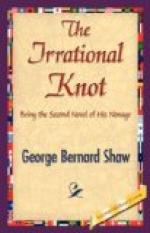“This—this fellow must have had opportunities of thrusting himself into her society of which I knew nothing. I thought she barely knew him. And if I had known, could I have suspected her of intriguing with an ill-bred adventurer! Yes, I might: my experience ought to have warned me that the taint was in her blood. Her mother did the same thing—left the position I had given her to run away with a charlatan, disgracing me without the shadow of an excuse or reason except her own innate love for what was low. I thought Marian had escaped that. I was proud of her—placed un—unbounded confidence in her.”
“She has struck me a blow,” said Douglas, “the infernal treachery——.” He checked himself, and after a moment resumed in his ordinary formal manner. “I must leave you, Mr. Lind. I am quite unable at present to discuss what has passed. Any conventional expressions of regret would be——Good-night.”
He bowed and left the room. Mr. Lind, taken aback, did not attempt to detain him or even return his bow, but stood biting his lips with a frown of discomfiture and menace. When he was alone, he paced the room several times. Then he procured some writing materials and sat down before them. He wrote nothing, but, after sitting for some time, he went upstairs. Passing Marian’s room he listened. The sharp voice and restless movements of his niece were the only sounds he heard. They seemed to frighten him; for he stole on quickly to his own room, and went to bed. Even there he could hear a shrill note of conversation occasionally from the opposite room, where Marian was sitting on a sofa, trying to subdue the hysteria which had been gaining on her since her escape from the balcony; whilst Elinor, seated on the corner of a drawer which projected from the dressing-table, talked incessantly in her most acrid tones.
“Henceforth,” she said, “Uncle Reginald is welcome to my heartiest detestation. I have been waiting ever since I knew him for an excuse to hate him; and now he has given me one. He has taken part—like a true parent—against you with a self-intoxicated fool whom he ought to have put out of the house. He has told me to mind my own business. I shall be even with him for that some day. I am as vindictive as an elephant: I hate people who are not vindictive: they are never grateful either, only incapable of any enduring sentiment. And Douglas! Sholto Douglas! The hero, the Newdigate poet, the handsome man! What a noble fellow he is when a little disappointment rubs his varnish off! I am glad I called him a coward to his face. I am thoroughly well satisfied with myself altogether: at last I have come out of a scene without having forgotten the right thing to say. You never see people in all their selfishness until they pretend to love you. See what you owe to your loving suitor, Sholto Douglas! See what you owe to your loving father, Reginald Lind!”
“I do not think that my father should have told me to leave the room,” said Marian. “It was Sholto’s place to have gone, not mine.”




